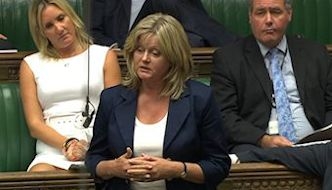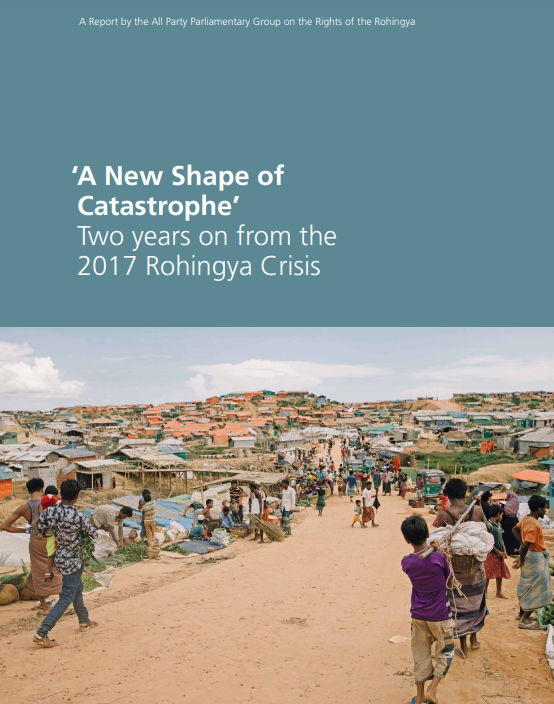Anne Main calls for action for people infected with contaminated blood in the 1970s and 1980s
Anne Main calls for government action to help people with haemophilia and others, who were infected via NHS contaminated blood products during the 1970s and 1980s, finally receive the support and justice they deserve.
The St Albans MP supported the motion before the House, which welcomed the Prime Minister’s commitment to look again at this issue, following the APPG’s report and a further review, and called on future governments to ‘pledge to do something about it’.
Mrs Anne Main (St Albans) (Con): Today’s debate has been very well informed, and I pay tribute to my right hon. Friend the Member for North East Bedfordshire (Alistair Burt) for bringing it to the House. This is about justice, and justice delayed is justice denied. Justice that has been delayed for such a long time is really no justice at all.
It has been noted that we are coming up to the general election, and I know that the NHS will be on the front of many of our leaflets. Our political literature will talk about the NHS and what it means to us and to our families, and about our hopes for it and the amount of money that we hope to spend on it. I do not want contaminated blood to be a subject of debate only for today.
This is about the trust that we and our families put in the NHS, but that trust was broken many years ago for many families, including one that I want to talk about today. It is important to recognise that we expect the NHS to give us the best medical treatment and advice available at the time. Many Members have pointed out that that advice was often ignored or pushed under the carpet; it was covered up even though it was known about. That is simply not good enough.
This tragedy has affected multiple members of many families. It has affected the quality of people’s lives and their aspirations over many years. People have described the situation to me as being forced by the state to join a club of whose existence they were unaware with rules that they did not understand, and being denied the ability to call it to account. People, including children, were unaware that they were being subjected—that is the right word—to treatment that was not in their best interests or appropriate for their condition. That failure by the state has been left to fester for too long, and it has left them with a legacy that is a disgrace and a stain on this House and on the NHS. Whoever is in the next Government, if they have used the term “NHS” on their leaflets, they must bear in mind that this debate today has joined the House in saying that we want better for those families.
I concur with what my right hon. Friend the Member for North East Bedfordshire said about reading out 1,800 names. In fact, we could read out the names of all the family members and carers involved. They are all victims; they have all lost a huge amount. We should not read out all those names, however, because many people do not want their names linked to the debate and made public. I am going to talk about my constituent, Nicola Enstone Jones. I asked her permission to use her name today, because I know that many people do not wish to have the stigma of being associated with all this, and with having to go cap in hand to get their rights recognised. I should like to give the House a flavour of some of the hardships that Nicola’s family have had to endure, and of the unfairness of a system that has no transparency.
Like many other Members, I have campaigned for Equitable Life victims. We have had many strong debates in the House about whether people’s estates should be included when the compensation payments were being made and about coming up with fair formulas. I have not heard the same zeal applied to this subject, although this is about people losing their lives, not their livelihoods. This is about people losing their hopes and dreams—just as the Equitable Life people did—but often losing them at a very young age.
I want to give Nicola’s story a brief airing today. It mirrors many of the stories that we have heard today, and it is important that we record as many of them as possible, because they show the unfairness, the anomalies and the degree to which families have to scrape to get a degree of justice. We have heard mention of very young children being affected, and Nicola was diagnosed with haemophilia at the age of seven or eight. In 1978 and 1979, she had tooth extractions—not exactly a hazardous thing—and treatment for a broken arm. In 1980, after a tonsillectomy, this young child was given factor VIII. It was by then known to be contaminated. Since that very day, her health has deteriorated, with symptoms associated with hepatitis C. Despite her mother’s concerns, she was told at the time that her daughter’s problems were psychological. Things were covered up. Throughout the years she continued to receive factor VIII for other operations and her health was always poor.
Over the years Nicola has lobbied me, as other hon. Members have been lobbied. When the Skipton Fund was announced, she was told that she could apply, but because in 1997 a consultant had stated that the virus had cleared, 17 years after she had been infected, she suddenly did not seem to meet the criteria. She has been turned down “on the balance of probabilities” by the Skipton Fund because her condition had been cleared for six months. Her mother, Mrs Enstone Jones, lived with that all those years, but because of a brief period when the virus was thought to have cleared, Nicola did not meet the criteria. She has been let down by the Skipton fund.
The report which has been mentioned so many times in the Chamber today stressed that the fund—the “third arm”, as I think it was called by the hon. Member for Wythenshawe and Sale East (Mike Kane), whose predecessor, Paul Goggins, worked tirelessly on the issue—is creating a barrier to justice, not facilitating justice. We must have a better system so that people do not feel that they have to jump through hoops, justify themselves, or make early applications in order to be able to go on holiday or get essential funding. The funds set up to deal with the issue are not dealing with it and, if anything, are trying to avoid dealing with it if they can and keep money back.
We do not wish to save the state money because, as the right hon. Member for Cardiff Central (Jenny Willott) said, we are speaking about a relatively small number of people. Let us get the matter sorted. Let us put in place a fair system. Let us make sure that all the other Enstone Joneses and all the other names that we cannot mention today for reasons of privacy do not feel that they have somebody acting against them, instead of acting for them. If nothing else comes of the debate in the House today, we should remember not just the NHS, but what the NHS means to those affected and their families. They trusted their health to the NHS many years ago, and the issue is as relevant today as it was then. Any of us who campaigns on the NHS in a few months’ time should remember that and pledge to do something about it if they are part of the next Government.
...
Earlier in the same debate
Mrs Anne Main (St Albans) (Con): It is fantastic that my right hon. Friend has brought this debate before the House, and I was pleased to support him at the Backbench Business Committee. Does he recall that when we made our presentation to the Committee its members were surprised that this was still going on, after such a long time? That is the crux of today’s debate: now is the time.
Alistair Burt: My hon. Friend is right about that. I will go on to say why this debate is happening today, and that is one of the reasons. This issue has not gone away, and even more colleagues are now aware of it.

DISSOLUTION OF PARLIAMENT
Watch: Anne Main, chair of the All Party Parliamentary Group on Bangladesh, talks about the Rohingya crisis and urges support for @DECappeal pic.twitter.com/FFL0lq8O0A
— DFID (@DFID_UK) October 12, 2017

